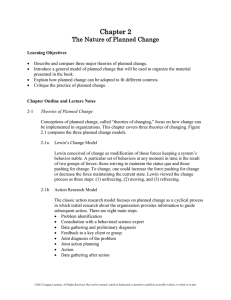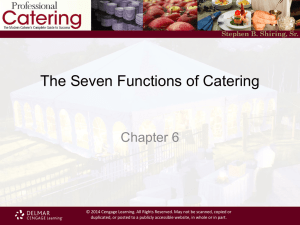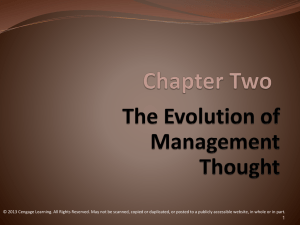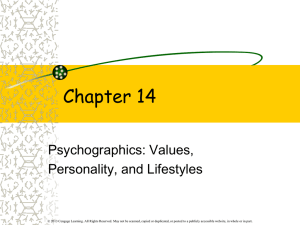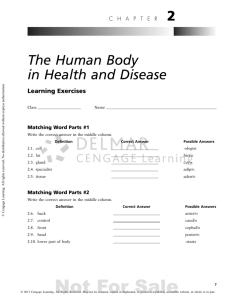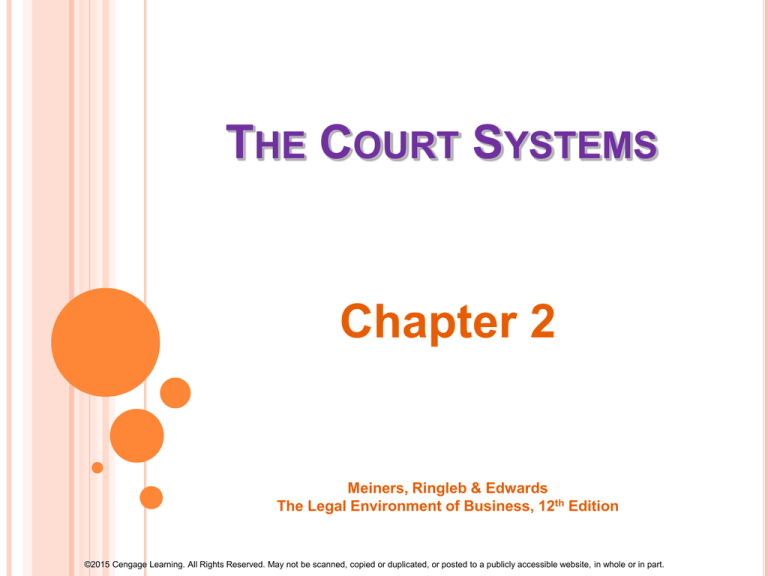
THE COURT SYSTEMS
Chapter 2
Meiners, Ringleb & Edwards
The Legal Environment of Business, 12th Edition
©2015 Cengage Learning. All Rights Reserved. May not be scanned, copied or duplicated, or posted to a publicly accessible website, in whole or in part.
Overview of the American court system
How an injured party can seek relief in the courts
Jurisdiction: Which court has the power and the authority
to decide the case?
Relations between court systems
©2015 Cengage Learning. All Rights Reserved. May not be scanned, copied or duplicated, or posted to a publicly accessible website, in whole or in part.
ORGANIZATION OF THE COURT SYSTEMS
Both state and federal court systems have
Lower courts: Courts of Original Jurisdiction
Where disputes are initially brought and tried
Generally known as trial courts
Look at issues of fact
Appellate Courts: Courts of Appellate Jurisdiction
Where lower court decisions are reviewed
Look at issues of law
©2015 Cengage Learning. All Rights Reserved. May not be scanned, copied or duplicated, or posted to a publicly accessible website, in whole or in part.
FEDERAL JUDGES
Federal judges are nominated by the President
Confirmed by a majority vote in US Senate
Lifetime appointment
May be removed from office only if Congress
impeaches them (intricate impeachment process
and rarely happens)
Job security guarantees that judges are
independent and free from political pressure
©2015 Cengage Learning. All Rights Reserved. May not be scanned, copied or duplicated, or posted to a publicly accessible website, in whole or in part.
STATE JUDGES
Judges chosen by variety of methods
Elected, appointed or mixture of both methods
Unlike federal court, most state judges serve fixed
terms
Evidence indicates that with elected judges the
average in tort cases are larger and out-of-state
companies are treated more poorly than in states with
appointed judges.
See Exhibit 2.1
©2015 Cengage Learning. All Rights Reserved. May not be scanned, copied or duplicated, or posted to a publicly accessible website, in whole or in part.
JUDICIAL IMMUNITY
o
A judge is absolutely immune from suit for damages for
judicial acts taken within his/her jurisdiction.
Without this, judges may fear being sued by unhappy
party to a lawsuit.
Purpose: Judges are not concerned with the relative
power of parties who appear in court.
Purpose: To protect the system from undue influence
on judicial decision-making
See Davis v. West
©2015 Cengage Learning. All Rights Reserved. May not be scanned, copied or duplicated, or posted to a publicly accessible website, in whole or in part.
CASE
DAVIS V. WEST
• Houston Reporting Service (HRS) provided court reporting services
for attorney Davis
• HRS billed Davis – was never paid
• Sued for $1083.98 (deposition, attorney’s fees, interest, costs)
• Davis did not defend – judge entered a default judgment
• HRS began collection efforts
• Court appointed Radoff as receiver in the case
• Court order commanded Radoff to take possession of “all . . .
monies in deposit [by Davis] in financial institutions . . . .”
• Radoff sent letter to HRS attorney asking for payment.
• Radoff sent letter to Davis’s bank demanding that the bank turn
over $4,144.91 to Radoff. Bank did.
• Judgment satisfied; HRS was paid; receivership closed.
• Davis sued Radoff for abuse of process.
• Trial court granted summary judgment for Radoff, as he was
entitled to derived judicial immunity. Davis appealed.
(Continued)
©2015 Cengage Learning. All Rights Reserved. May not be scanned, copied or duplicated, or posted to a publicly accessible website, in whole or in part.
CASE
DAVIS V. WEST
• Held: Affirmed. Radoff is cloaked with derived judicial immunity.
• Derived judicial immunity by a person is the same as absolute
immunity for judges.
• Judicial immunity can attach to certain non-judges when judges
delegate their authority, appointing another to perform services for
the court (as an “officer of the court”).
• Texas uses the “functional approach”– looks “whether the person
seeking immunity is intimately associated with the judicial process.
• Also “that person exercises discretionary judgment comparable to
that of the judge”
• Functional approach focuses on nature of the function performed &
if person’s conduct is like the delegating judge.
• Radoff is “cloaked with derived judicial immunity”.
• Every action “whether good or bad, honest or dishonest, wellintentioned or not” is immune as applied to the function
undertaken.
©2015 Cengage Learning. All Rights Reserved. May not be scanned, copied or duplicated, or posted to a publicly accessible website, in whole or in part.
THE FEDERAL COURT SYSTEM
Federal District Court
U.S. Court of Appeals
Specialized Federal Courts
U.S. Supreme Court
©2015 Cengage Learning. All Rights Reserved. May not be scanned, copied or duplicated, or posted to a publicly accessible website, in whole or in part.
FEDERAL DISTRICT COURT
Courts of original jurisdiction
Use juries or judge as “trier of fact”
Trial courts deal in issues of fact
Federal trial courts also use judicial officers called
“magistrates”
94 federal districts in the court system
©2015 Cengage Learning. All Rights Reserved. May not be scanned, copied or duplicated, or posted to a publicly accessible website, in whole or in part.
U.S. COURT OF APPEALS
12 courts
Usual rule: There is the right to appeal to this court
3 judge panels deal in issues of law and review most
decisions
En banc proceeding means all active judges in a
circuit will a hear a case
©2015 Cengage Learning. All Rights Reserved. May not be scanned, copied or duplicated, or posted to a publicly accessible website, in whole or in part.
SPECIALIZED FEDERAL COURTS
Limited jurisdiction
Ex: U.S. Bankruptcy Courts
Ex: Court of Appeals for the Federal Circuit takes appeals
from
U.S. District Court in patent, trademark and copyright cases
U.S. Court of Federal Claims
U.S. Court of International Trade
U.S. Tax Court
See Exhibit 2.2
See also Exhibit 2.3
©2015 Cengage Learning. All Rights Reserved. May not be scanned, copied or duplicated, or posted to a publicly accessible website, in whole or in part.
THE U.S. SUPREME COURT
Highest court in the country
Appellate review court
Cases usually heard by 9 justices
Term begins First Monday in October in Washington, D.C.
Receives thousands of petitions each year
Issues about 70-80 opinions per term
Reviews cases from
U.S. District Courts
U.S. Courts of Appeals
Highest Courts of the States
Review is through Writ of Certiorari
Often deal with Constitutional decisions
If writ not granted, lower court decision is final
©2015 Cengage Learning. All Rights Reserved. May not be scanned, copied or duplicated, or posted to a publicly accessible website, in whole or in part.
INTERNATIONAL PERSPECTIVE
“THE FRENCH COURT SYSTEM”
• France is a civil law country (typical of Europe)
• Written (code) law used rather than judge-made law
• Court System
Cour de cessation (Supreme Court)
Cour d’appel (Court of Appeals)
Tribunal d’instance (Court of general jurisdiction)
• Appellate process in France is very different from U.S.
Cour de Cessation: no authority to create judgments
Cour de Cessation: rejects an appeal or invalidates the
decision & returns case to Cour d’appel for
reconsideration
©2015 Cengage Learning. All Rights Reserved. May not be scanned, copied or duplicated, or posted to a publicly accessible website, in whole or in part.
THE TYPICAL STATE COURT SYSTEM
State court of Original Jurisdiction
Where case is first brought; deals in issues of fact
Usually called District Court (But in NY, is called the “Supreme Court”)
State court of Appellate Jurisdiction
Deals with appeals and issues of law
Usually called Court of Appeals
Can have different names (District Court of Appeals in FL; Appellate
Division in NY)
State Supreme Court
Second appellate review dealing w/issues of law
Usually called Supreme Court (but in NY, is called “Court of Appeals”)
©2015 Cengage Learning. All Rights Reserved. May not be scanned, copied or duplicated, or posted to a publicly accessible website, in whole or in part.
RULES OF CIVIL PROCEDURE
(IN UNITED STATES CODE, TITLE 28)
Federal Rules of Civil Procedure: Govern procedural
aspects of litigation
Pleadings
Discovery
Trial procedures
Relevant motions
States are free to develop their own procedural rules
Most adopt the Federal Rules of Civil Procedure or rules very
similar to them
©2015 Cengage Learning. All Rights Reserved. May not be scanned, copied or duplicated, or posted to a publicly accessible website, in whole or in part.
Jurisdiction: Right of a court to hear and decide the case
A number of courts may have jurisdiction over a given
case
Need jurisdiction over the subject matter
Need jurisdiction over either persons or property
If jurisdiction is lacking, judgment is null and void
©2015 Cengage Learning. All Rights Reserved. May not be scanned, copied or duplicated, or posted to a publicly accessible website, in whole or in part.
Literal Meaning: “The power to speak of the law”
Plaintiff must select a court that has
Subject-matter jurisdiction
Created by constitution or statute
and
Personal jurisdiction over
The person of the defendant
or
The property of the defendant
©2015 Cengage Learning. All Rights Reserved. May not be scanned, copied or duplicated, or posted to a publicly accessible website, in whole or in part.
SUBJECT MATTER JURISDICTION:
FEDERAL COURTS
Federal court jurisdiction is derived from the U.S.
Constitution
Federal courts may hear cases involving federal questions
Cases in which the U.S. is a party to the suit
Cases involving citizens of different states
Diversity of citizenship jurisdiction
Amount in Controversy is for more than $75,000
No $ amount needed for cases involving federal law
©2015 Cengage Learning. All Rights Reserved. May not be scanned, copied or duplicated, or posted to a publicly accessible website, in whole or in part.
SUBJECT MATTER JURISDICTION:
STATE COURTS
A particular court may resolve a particular subject matter, i.e.
Wills & Trusts: Probate Court
Divorces, Child Custody: Domestic/Family Court
Municipal Matters: Municipal Court
Small Claims Court - Limited claims of usually $5000 or less, sometimes up
to $10,000 will be heard
If there is not a particular subject matter, case first goes to general trial court
Courts of original jurisdiction – where case is first brought
Courts of appellate jurisdiction – where lower court decisions are reviewed
If there is no jury, judge decides the facts
General right to appeal to at least one higher court
©2015 Cengage Learning. All Rights Reserved. May not be scanned, copied or duplicated, or posted to a publicly accessible website, in whole or in part.
INTERNATIONAL PERSPECTIVE
“LONDON’S COMMERCIAL COURT”
• In international contracts, parties can state how future
disputes will be resolved either in the contract or when
disputes arise.
• The Commercial Court in London is a popular forum.
o
Trials handled by one judge
o
No jury
o
Trials usually occur within 1 year of dispute
o
Finished rather quickly
o
Loser pays winner’s attorney’s fees
o
English courts are respected; judgment more likely to be
enforced in other countries
o
Remedies have been innovative & relevant to commercial
matters
©2015 Cengage Learning. All Rights Reserved. May not be scanned, copied or duplicated, or posted to a publicly accessible website, in whole or in part.
PERSONAL JURISDICTION:
IN PERSONAM JURISDICTION
Over the person, usually through
Summons through service of process or substituted service
Residency
Doing business in the state
Submission to the jurisdiction
Out of state defendants
Jurisdiction is more difficult
Serve them while in the state
May not “trick” them to get into the state for service of process
See Exhibit 2.4
©2015 Cengage Learning. All Rights Reserved. May not be scanned, copied or duplicated, or posted to a publicly accessible website, in whole or in part.
JURISDICTION OVER OUT-OF-STATE BUSINESS
DEFENDANTS
Long-arm Statutes
Aimed at non-resident businesses
Protects states’ citizens from business defendants who do
business in the state and then leave the state
Jurisdiction over corporations:
Court of the state in which corporation was incorporated
Court is in a state where corporation has headquarters or
main plant
Court is in a state in which corporation is doing business
See Exhibit 2.5 re: Long-Arm Statute
See “The ‘Long Arm’ of the Law”
©2015 Cengage Learning. All Rights Reserved. May not be scanned, copied or duplicated, or posted to a publicly accessible website, in whole or in part.
CYBERLAW
“THE LONG ARM OF THE INTERNET”
• When does a web site advertiser in nationwide sales become subject
to another state’s jurisdiction?
o
Generally personal jurisdiction occurs when defendant is
engaged in business in a state.
o
i.e. Amazon.com does active business in every state by selling
online, and is subject jurisdiction in those states
• No jurisdiction if contact with a forum is “only informational”, even if
the web site is interactive
• No jurisdiction if web site gives information about sales, allows
customers to download forms and provides e-mail address for
inquiries
• Unclear area: How much sales activity must occur with residents in a
state for the web seller to become subject to jurisdiction in the
buyer’s state?
o
Ex: One low cost item is not “active business”, esp. if buyer
initiates the contact.
o
Ex: One spam e-mail sent out of state – no jurisdiction
©2015 Cengage Learning. All Rights Reserved. May not be scanned, copied or duplicated, or posted to a publicly accessible website, in whole or in part.
CASE
BLIMKA V. MY WEB WHOLESALER, LLC
• My Web Wholesalers (of Maine) does business on the Internet.
• Blimka (of Idaho) surfed the net, found My Web and called DePalma,
a My Web manager.
• Ordered 26,500 pairs of jeans for $20,935 and wired money
• Shipment of 16,000 jeans arrived. Blimka called My Web to also
complain about quality.
• Blimka sued for fraud against My Web and DePalma in Idaho court.
Process was served on defendants in Maine.
• No response by defendants; court issued a judgment against both
defendants, saying it had jurisdiction. They appealed.
• HELD: Affirmed. Idaho court has jurisdiction.
Defendants’ actions of fraud invoked the use of the Idaho longarm statute.
Defendants’ purposeful false misrepresentation directed into Idaho
created minimum contacts with Idaho that does not offend 14th
Amendment “traditional notions of fair play and substantial
justice”.
Blimka awarded attorney fees and costs.
©2015 Cengage Learning. All Rights Reserved. May not be scanned, copied or duplicated, or posted to a publicly accessible website, in whole or in part.
ISSUE SPOTTER
“CAN YOUR FIRM BE REACHED?”
• You work for Florida real estate development firm called
Golden Shores.
• Many clients are people coming to Florida from New York to
retire.
• To increase marketing, e-mails are sent to potential clients,
offering 5% discount to buyers who respond by e-mail and
buy property.
• New York requires real estate agents who offer property for
sale to be registered in the state of New York.
• A colleague in the firm says this law doesn’t apply to your
company because Golden Shores is located in Florida – the
only communication with New York is through e-mail
• Colleague says that New York authorities cannot come after
Golden Shores for any violations.
IS THE COLLEAGUE CORRECT???
©2015 Cengage Learning. All Rights Reserved. May not be scanned, copied or duplicated, or posted to a publicly accessible website, in whole or in part.
JURISDICTION OVER PROPERTY
In rem jurisdiction
In rem (rem means “the thing”)
The dispute between the parties is over property
Where property is located creates jurisdiction
Whether the defendant-property owner is within the jurisdiction
does not matter
Tangible property creates in rem jurisdiction – i.e real estate,
personal property
Intangible property creates in rem – i.e. bank accounts, stocks
If property is removed to another state, no in rem jurisdiction
©2015 Cengage Learning. All Rights Reserved. May not be scanned, copied or duplicated, or posted to a publicly accessible website, in whole or in part.
EXCLUSIVE JURISDICTION
Federal courts have exclusive
jurisdiction over some matters
State courts have exclusive
jurisdiction over some matters
Examples:
Examples:
Federal crimes
Divorce
Bankruptcy
Adoption
Patents
Copyrights
Matters controlled by state
government
Federal questions
Congress can specify by statute
exclusive jurisdiction in federal
courts
Supremacy of federal law—
state jurisdiction cannot infringe
on federal jurisdiction
©2015 Cengage Learning. All Rights Reserved. May not be scanned, copied or duplicated, or posted to a publicly accessible website, in whole or in part.
CONCURRENT JURISDICTION
Federal and state courts have exclusive jurisdiction over some
matters; HOWEVER,
Sometimes both state & federal courts have concurrent jurisdiction.
Plaintiff may bring suit in either court system
If plaintiff chooses state court,
Defendant has right to remove to federal court (right of removal in
diversity of citizenship cases).
If plaintiff files suit in defendant’s home state court
Defendant cannot move case to federal court.
Sometimes Congress will explicitly give federal courts exclusive
jurisdiction over an area of law.
See Exhibit 2.6
©2015 Cengage Learning. All Rights Reserved. May not be scanned, copied or duplicated, or posted to a publicly accessible website, in whole or in part.
APPLYING APPROPRIATE LAW IN FEDERAL
COURT
Issue: When there is diversity of citizenship, which substantive law should
the federal court apply?
Ex: Lil Wayne and Jay-Z are involved in dispute over rights to revenue
from a concert
Lil Wayne sued Jay-Z in California
Both were from California
Case would be decided in California
Ex: Lil Wayne is from California & Jay-Z is from Florida.
If amount in controversy exceeded $75,000, federal court can decide case
based on diversity of citizenship
If case involves statutory law, court will apply law of the statute
What if case involves common-law issues?
Courts will apply law of state “with most significant interest” to the outcome
See Erie v. Tompkins
See Exhibit 2.7
©2015 Cengage Learning. All Rights Reserved. May not be scanned, copied or duplicated, or posted to a publicly accessible website, in whole or in part.
CASE
ERIE RR CO. V. TOMPKINS
• “A dark night”; protruding object from train owned by Erie RR;
Tompkins injured as he stood next to the tracks in Pennsylvania
• He claimed accident caused by negligent operation of train
• Tompkins: Pennsylvania citizen
• Erie: Incorporated in NY
• Accident: In Pennsylvania
• If federal common law applies: Erie is liable
• If Pennsylvania common law: Tompkins trespassed & Erie is not
liable
• Trial court applied federal common law. Jury awarded $30,000 to
Tompkins. Affirmed by the Court of Appeals. Erie appealed to the
Supreme Court.
• Held: Concept of federal common law in diversity of citizenship
cases is ended. Federal courts will apply relevant state law.
• Pennsylvania law applies. Tompkins is a trespasser. Erie is not
liable.
©2015 Cengage Learning. All Rights Reserved. May not be scanned, copied or duplicated, or posted to a publicly accessible website, in whole or in part.
APPLYING APPROPRIATE LAW IN STATE COURT
Incidents of the case take place in more than one state
Conflict of laws or choice of law rules apply
Rules vary according to nature of dispute, i.e.
Contract cases: Laws of state in which contract was made will
be applied
Tort cases: Laws of state where tort takes place
States try to look at interests of the parties, government,
policies
General rule: Laws apply for state that has the most
“significant interest”
See Exhibit 2.7
©2015 Cengage Learning. All Rights Reserved. May not be scanned, copied or duplicated, or posted to a publicly accessible website, in whole or in part.
VENUE
Venue: Appropriate geographical location (proper place) where the
lawsuit is heard
In controversial or well-publicized cases, defendants will ask for
change of venue
Will be in same court system, but likely in a different geographical
location
Doctrine of forum non conveniens – a special venue doctrine: Either
party may request a change of venue to a more convenient court that
could hear the case. Court will consider such issues as
Where actions of case take place
Where witnesses are located
Unfair burdens to parties
See BancorpSouth Bank v. Hazelwood Logistics Center, LLC
©2015 Cengage Learning. All Rights Reserved. May not be scanned, copied or duplicated, or posted to a publicly accessible website, in whole or in part.
CASE
BANCORPSOUTH BANK V. HAZELWOOD
LOGISTICS CENTER, LLC
• HLC was formed to build commercial real estate development
project in Missouri (Hazelwood Logistics Center)
• HLC – Missouri company – got loan from BancorpSouth Bank (the
Bank) – Mississippi company
• Later 4 Missouri banks (Participating Banks) joined
o
Lent more money for HLC
o
However Bank was the lead lender in the project
• Owners of HLC provided guaranty on loan if problems arose
• Property HLC chose had environmental problems
• Development halted – loan came due
• Bank sued for payment from HLC’s owners in Federal District
Court in Missouri
• Hazelwood moved to dismiss, saying 1) venue was improper & 2)
federal district court lacked subject matter jurisdiction
• Federal District Court held it had jurisdiction and venue was proper
-- HLC appealed
(Continued)
©2015 Cengage Learning. All Rights Reserved. May not be scanned, copied or duplicated, or posted to a publicly accessible website, in whole or in part.
CASE
BANCORPSOUTH BANK V. HAZELWOOD LOGISTICS CENTER, LLC
• AFFIRMED. Forum selection clauses in documents were upheld
o
The clauses did not prohibit the bank from bringing suit in U.S. District
Court for the Eastern District of Missouri.
• In diversity case, court will apply substantive law that would be applied by
Missouri state court
• Loan agreements and guaranty provided/stated that Missouri law governs
interpretation & application of the contracts.
• This is a “choice of law” provision – binds the parties to Missouri law
• Hazelwood argued #1: Lack of complete “diversity” because at least some of
participating banks are Missouri citizens
o
•
Court disagreed ; Said the participating banks were not demonstrated as
necessary parties to the suit; District court properly exercised jurisdiction
Hazelwood argued #2: Action in federal court violated loan agreements and
guaranty’s choice of venue provisions
o
Court disagreed.
o
Documents did not “limit the right of [the bank] to bring action. . . against
(HLC) in the Court of any other jurisdiction.”
o
Loan agreements provided an action “may be brought in the Courts of St.
Louis County, but do not indicate such actions must be brought there . . . .”
©2015 Cengage Learning. All Rights Reserved. May not be scanned, copied or duplicated, or posted to a publicly accessible website, in whole or in part.



